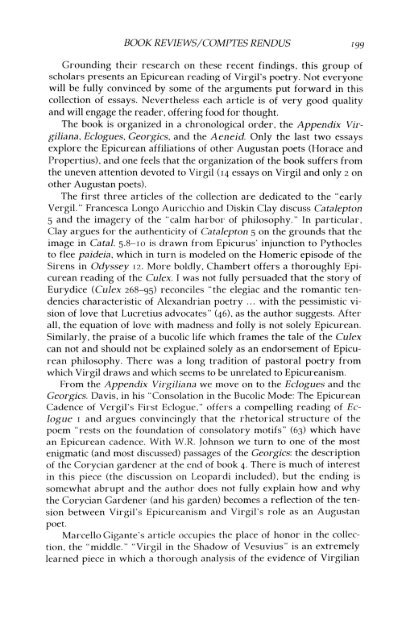MOUSEION - Memorial University of Newfoundland
MOUSEION - Memorial University of Newfoundland
MOUSEION - Memorial University of Newfoundland
You also want an ePaper? Increase the reach of your titles
YUMPU automatically turns print PDFs into web optimized ePapers that Google loves.
BOOK REVIEWs/COMPTEs RENDUS [99<br />
Grounding their research on these recent findings, this group <strong>of</strong><br />
scholars presents an Epicurean reading <strong>of</strong> Virgil's poetry. Not everyone<br />
will be fully convinced by some <strong>of</strong> the arguments put forward in this<br />
collection <strong>of</strong> essays. Nevertheless each article is <strong>of</strong> very good quality<br />
and will engage the reader. <strong>of</strong>fering food for thought.<br />
The book is organized in a chronological order, the Appendix Virgiliana.<br />
Eclogues. Georgics. and the Aeneid. Only the last two essays<br />
explore the Epicurean affiliations <strong>of</strong> other Augustan poets (Horace and<br />
Propertius), and one feels that the organization <strong>of</strong> the book suffers from<br />
the uneven attention devoted to Virgil (14 essays on Virgil and only 2 on<br />
other Augustan poets).<br />
The first three articles <strong>of</strong> the collection are dedicated to the "early<br />
Vergil." Francesca Longo Auricchio and Diskin Clay discuss Catalepton<br />
5 and the imagery <strong>of</strong> the "calm harbor <strong>of</strong> philosophy." In particular.<br />
Clay argues for the authenticity <strong>of</strong> Catalepton 5 on the grounds that the<br />
image in CataJ. 5.8-10 is drawn from Epicurus' injunction to Pythocles<br />
to flee paideia. which in turn is modeled on the Homeric episode <strong>of</strong> the<br />
Sirens in Odyssey [2. More boldly. Chambert <strong>of</strong>fers a thoroughly Epicurean<br />
reading <strong>of</strong> the Culex. I was not fully persuaded that the story <strong>of</strong><br />
Eurydice (Culex 268-95) reconciles "the elegiac and the romantic tendencies<br />
characteristic <strong>of</strong> Alexandrian poetry ... with the pessimistic vision<br />
<strong>of</strong> love that Lucretius advocates" (46). as the author suggests. After<br />
all. the equation <strong>of</strong> love with madness and folly is not solely Epicurean.<br />
Similarly. the praise <strong>of</strong> a bucolic life which frames the tale <strong>of</strong> the Culex<br />
can not and should not be explained solely as an endorsement <strong>of</strong> Epicurean<br />
philosophy. There was a long tradition <strong>of</strong> pastoral poetry from<br />
which Virgil draws and which seems to be unrelated to Epicureanism.<br />
From the Appendix Virgiliana we move on to the Eclogues and the<br />
Georgics. Davis. in his "Consolation in the Bucolic Mode: The Epicurean<br />
Cadence <strong>of</strong> Vergil's First Eclogue." <strong>of</strong>fers a compelling reading <strong>of</strong> Eclogue<br />
I and argues convincingly that the rhetorical structure <strong>of</strong> the<br />
poem "rests on the foundation <strong>of</strong> consolatory motifs" (63) which have<br />
an Epicurean cadence. With W.R. Johnson we turn to one <strong>of</strong> the most<br />
enigmatic (and most discussed) passages <strong>of</strong> the Georgics: the description<br />
<strong>of</strong> the Corycian gardener at the end <strong>of</strong> book 4. There is much <strong>of</strong> inter'est<br />
in this piece (the discussion on Leopardi included). but the ending is<br />
somewhat abrupt and the authol' does not fully explain how and why<br />
the Corycian Gardener (and his garden) becomes a reflection <strong>of</strong> the tension<br />
between Virgil's Epicureanism and Virgil's role as an Augustan<br />
poet.<br />
Marcello Gigante's article occupies the place <strong>of</strong> honor in the collection.<br />
the "middle." "Virgil in the Shadow <strong>of</strong> Vesuvius" is an extremely<br />
learned piece in which a thorough analysis <strong>of</strong> the evidence <strong>of</strong> Virgilian

















